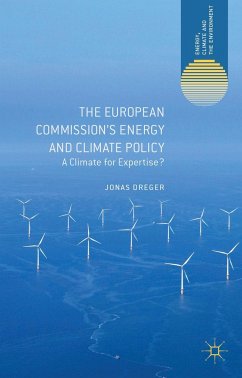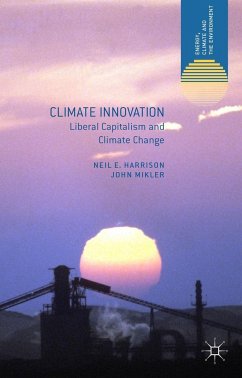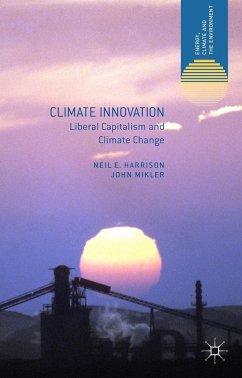
J. Dreger
Broschiertes Buch
The European Commission's Energy and Climate Policy
A Climate for Expertise?
Versandkostenfrei!
Versandfertig in 6-10 Tagen
Weitere Ausgaben:

PAYBACK Punkte
38 °P sammeln!





This book offers a deep insight into the genesis and development of the European Commission's energy and climate legislation, focusing on the interplay of politics and science. How does the Commission react when confronted with knowledge? According to the author, the Commission functions as catalyst transforming knowledge into politics.
Jonas Dreger is a policy advisor on environmental policy. He gained his MA from the College of Europe, Belgium, and worked as a doctoral researcher at the BGSS at the Humboldt University of Berlin, Germany, and the European University Institute in Florence, Italy. His research covers climate and energy policy, lobbying and EU institutions.
Produktdetails
- Energy, Climate and the Environment
- Verlag: Palgrave Macmillan / Palgrave Macmillan UK / Springer Palgrave Macmillan
- Artikelnr. des Verlages: 978-1-349-47918-4
- 1st ed. 2014
- Seitenzahl: 226
- Erscheinungstermin: 1. Januar 2014
- Englisch
- Abmessung: 216mm x 140mm x 13mm
- Gewicht: 311g
- ISBN-13: 9781349479184
- ISBN-10: 1349479187
- Artikelnr.: 45069222
Herstellerkennzeichnung
Libri GmbH
Europaallee 1
36244 Bad Hersfeld
gpsr@libri.de
"The EU energy and climate package of 2008 is a milestone in climate and energy policy that has firmly established Europe's leadership in this critical field. As we discuss our new policy framework beyond 2020, this book is a very timely contribution for practitioners and scholars alike. It captures well how the European Commission reconciled the necessary with the politically achievable when proposing the 2008 package." - J.M. Barroso, President of the European Commission
"A meticulous study of the world's first attempt to set up a large-scale carbon trading system to reduce CO2 emissions. It will be of interest not only to students of the politics of climate change and the governance of the EU, but to those initiating or
"A meticulous study of the world's first attempt to set up a large-scale carbon trading system to reduce CO2 emissions. It will be of interest not only to students of the politics of climate change and the governance of the EU, but to those initiating or
Mehr anzeigen
contemplating parallel programmes in other parts of the world today"- Anthony Giddens, author of The Politics of Climate Change
"This book provides important new insights into internal Commission dynamics in the issue area of climate change. I warmly recommend it." - Jørgen Wettestad, Fridtjof Nansen Institute, Norway
"The volume is rich with inspiration for the IPE community no doubt it will spur new directions in theorising on energy governance, as it explicitly aspires to do." - Europe-Asia Studies
"Readers from the energy industry although they are not Dreger's target audience can learn a lot from the book and better understand many details of the ETS and the renewables Directive ... this book is certainly amajor contribution to political and organizational science and offers many insights in the dynamics of decision-making." - European Energy Journal
"This book provides important new insights into internal Commission dynamics in the issue area of climate change. I warmly recommend it." - Jørgen Wettestad, Fridtjof Nansen Institute, Norway
"The volume is rich with inspiration for the IPE community no doubt it will spur new directions in theorising on energy governance, as it explicitly aspires to do." - Europe-Asia Studies
"Readers from the energy industry although they are not Dreger's target audience can learn a lot from the book and better understand many details of the ETS and the renewables Directive ... this book is certainly amajor contribution to political and organizational science and offers many insights in the dynamics of decision-making." - European Energy Journal
Schließen
Für dieses Produkt wurde noch keine Bewertung abgegeben. Wir würden uns sehr freuen, wenn du die erste Bewertung schreibst!
Eine Bewertung schreiben
Eine Bewertung schreiben
Andere Kunden interessierten sich für











